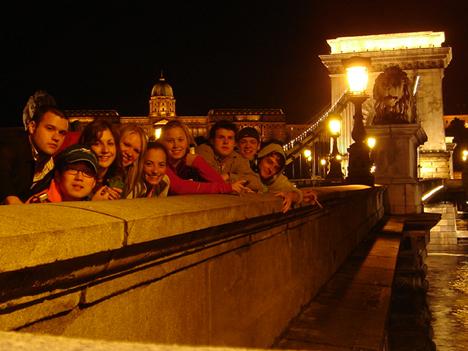A different kind of summer vacation
June 13, 2006
Most students spend their summer working to help keep themselves out of debt, taking classes to boost their GPA or doing absolutely nothing. However, for Michael Wesolowski, senior in LAS, the summer started off with spending a month in Vienna, Austria while taking Anthropology 199.
Wesolowski is one of 751 students that chose to study abroad this summer, said Erika Ryser, Associate Director of study abroad.
“I’ve heard so many good things about it,” Wesolowski said. “I thought now would be a good time to (study abroad) before I graduate.”
During the summer and winter break, students have the opportunity to take a class while abroad for a month. The classes, offered through the University, are a collaboration of the study abroad office and the specific colleges. This program allows students in every major to have the opportunity to study in another country without forcing them to stay for another semester, Ryser said.
Wesolowski said that the month was the perfect amount of time for him to spend in Vienna.
Get The Daily Illini in your inbox!
“It was enough time to know the city, but gives me time to be at home and have a good time with my friends and family,” he said.
Studying abroad teaches students how to better interact with people from different backgrounds. They learn how to adapt to a host culture by examining their behavior and assumptions, as well as change some of their habits to create lasting relationships with others, Ryser said.
“(The culture) was a shock but a good one,” Wesolowski said. “It helped me understand and appreciate our culture more- – not that (Vienna) wasn’t nice, but we have more opportunities in the United States.”
One difference he noticed between the two countries was peoples’ attitudes toward each other. They were really rude toward us, but not because the group was from America; we had to learn not to take it personally and understand that that’s how it is there, Wesolowski said.
Alex Grandpre, senior in FAA, who is currently in Rome, Italy, also notices the difference in how people interact in another country.
“The service is already included in the bill so the waiters/waitresses don’t give two cents about you; it’s just how they feel like being (that day).”
While in Rome, Grandpre said the restaurants don’t serve free bread or water either.
“When I get back to America, I’m eating a million pieces of bread with butter and free water,” he said.
Wesolowski said he ran into some of the same problems.
“Water is like liquid gold there,” he said.
It’s important that you ask for the right kind of water, too. In Vienna, people have the choice of carbonated water so it is essential to specify water with or without gas when ordering. If you want free water, Wesolowski said, order tap water.
Ketchup costs fifty cents a packet, which was a big problem for big-time ketchup user Wesolowski. The group ended up buying a bottle of ketchup and having someone carry it to the restaurant.
Another difference Wesolowski noticed was the night life, saying that people in Vienna party a lot harder than what he is use to in Champaign. Happy hour starts around 9 p.m. and people generally head to the bars around 12:30 or 1 a.m.
Communicating can be another issue while abroad. In Vienna, every person is required to take English, so Wesolowski said it was easier than other countries to navigate, but there was still a language barrier.
He also had a roommate from Turkey who didn’t speak English. When Wesolowski wanted to talk to him, they used a translator on a computer to figure out what the other person was saying.
“Where I am is pretty touristy, so people knowing English wasn’t really a problem,” Grandpre said. “That’s what I thought was going to be the biggest problem.”
For students interested in studying abroad they should begin to start looking about a year in advance, Ryser said.
Most summer programs deadlines are in December or February for courses offered during the first four to eight weeks of the summer. Visiting the study abroad Web site at http://www.ips.uiuc.edu/sao/ will help students keep up-to-date with deadlines and other information.
During the fall and spring the study abroad office offers First Step meetings that provide students with resources and educating them on what they should be considering when picking out a program, she said.
“The summer program is a good way to get your feet wet if you’re unsure about international experience,” Ryser said.
The program allows students to experience the culture first-hand, go home and reflect, and go back again if they desire. With the resources available to students, there is no reason they shouldn’t take advantage of the opportunity.
“You almost never hear people say they wish they didn’t study abroad,” she said.
The study abroad office also offers resources for scholarships for students with a tighter budget.
“Finances shouldn’t keep any one from studying abroad,” said David Schug, scholarships for international study.
There is a variety of scholarships offered for merit, financial need both through the University and internationally. Students are advised to address scholarships in the essay, but don’t write one essay for five different scholarships, he said.
“They always say it’s like your one last chance to go to Europe … and the only thing it’s going to you is a little more debt. It’s really worth it,” Grandpre said.







